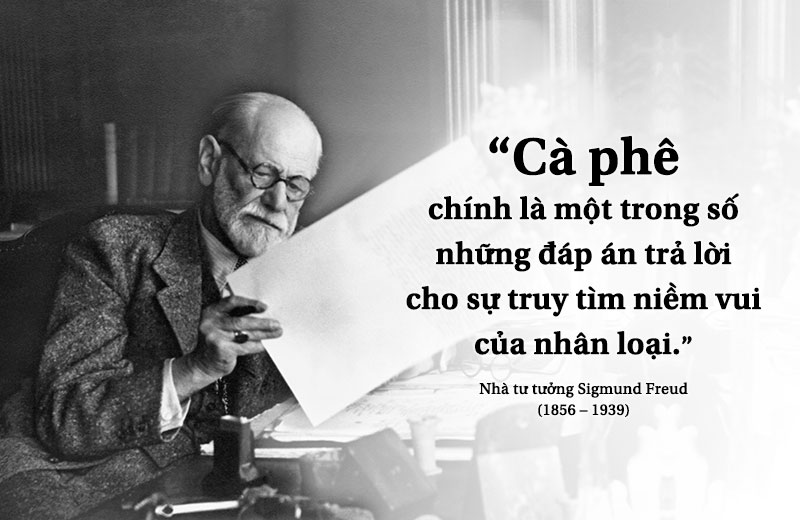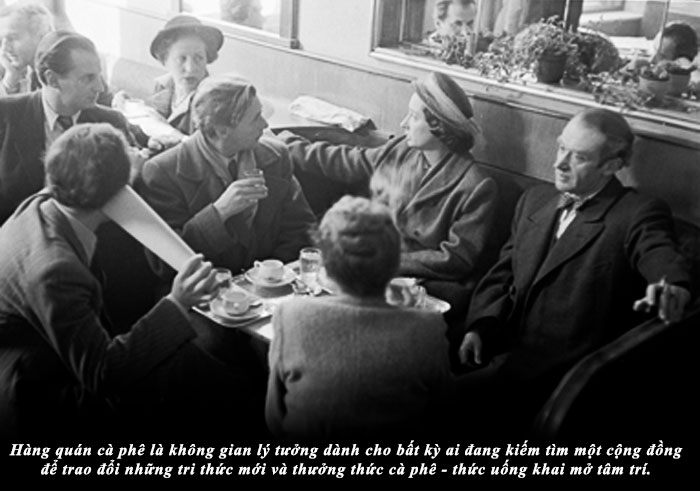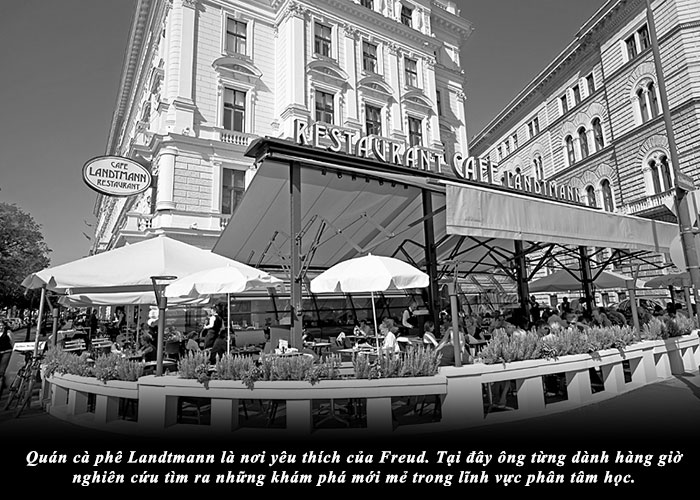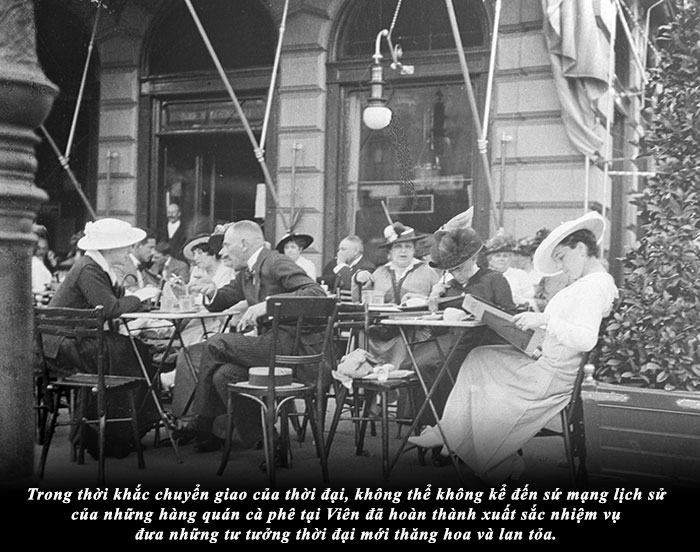Article 33: Coffee shop – the opening place of Sigmund Freud’s modern thought
In the 19th century, coffee shops became the ideal space chosen by intellectuals in Vienna, such as philosopher Sigmund Freud, as a place to cherish and sublimate great ideas.

“Coffee is one of the answers to humanity’s quest for joy.” – Sigmund Freud (1856-1939)
In the research essay “Coffee shops in Vienna and the culture of the Fin-de-Siècle era”, Professor Edwards Timms identified coffee shops in Vienna as an important conversational space promoting creativity. He said: “In the city of Vienna, where Sigmund Freud lived around 1910, avant-garde intellectuals, artists and musicians enjoyed the benefit of unique public spaces such as Café Central and Café Griensteidl. These were prestigious and well-known cafes among intellectuals, attracting constant attention from cultural, historian, literary,…”

The coffee shop was the ideal space for anyone who was looking for a community to exchange new knowledge and enjoy coffee – a mind-opening drink.
From the end of the 17th century, coffee shops began to appear in Vienna and blossomed in the late 18th century with a variety of spaces ranging from oasis coffee, newspaper coffee, concert coffee to billiard coffee, etc. It was a favorite place for intellectuals from artists, writers, politicians to philosophers. If you stepped into a coffee shop here in 1903, you would see Sigmund Freud sitting at a table with Gustav Klimt, Leon Trotsky or even Adolf Hitler because they all lived in Vienna during this period and had a habit of going to the café on a regular basis.
It can be said that Viennese coffee shops became particularly important places. It acted as a catalyst for new ideas to be sublimated, propagated, and responded to the changes of the times in the late 19th century, also known by the characteristic name “Fin-de-Siècle” (The moment of transition).
During the “Fin-de-Siècle” period, people faced the crisis of consciousness – the consequence of the industrial revolution. If the “tragedy” of the whole of pre-modern times had been the denial of theocracy, then in the modern period the most worrying thing was the excessive belief in technology, the rationalization of consciousness, and thus destroyed the purpose of human existence.
During the post-Capitalism period, man was put in opposition to a giant organization – the state and modern industry – operating for its own interests, often becoming alienated, even turned people into objects, “materialized” people. Humans now lost their own freedom, becoming the screw of a giant industrial machine.

The Landtmann Café was Freud’s favorite place. There he spent hours researching to find new discoveries in the field of psychoanalysis.
The reality of modern society at this time sharply raised the issue of inner freedom of man, the desire for spiritual liberation was getting bigger and bigger. At that time, the dark sides of human nature began to be examined in terms of purifying that nature. And Sigmund Freud was a pioneer philosopher in exploring the depths of emotions, explaining and soothing the mysterious inner world of people.
Sigmund Freud developed his worldview right at Café Landtmann. He spent hours exploring the essentials that an orderly society needed to function and to overcome a state of inner conflict. From here, important works that laid the foundation for Psychoanalysis were born explaining the source of energy within each human being in the dialectical relationship of the cosmic order and human history. The theory of Sigmund Freud posits that each civilization has a source of energy leading to artistic and scientific achievements through the sublimation of human instincts. The method of psychoanalysis releases restrained energies and regulates emotional conflicts in order to achieve the perfection of moral conscience.
In 1908, Sigmund Freud founded the Society of Psychoanalysts and held weekly talks at Café Korb. New researches on the conflicts between conscious reality and the unconscious part of the mental system shared by intellectuals at Café Korb further refined psychoanalytic theory. At the same time, some psychologists and sociologists such as Alfred Adler, Carl Gustav Jung, Karen Horney, Harry Stack Sullivan… developed psychoanalysis according to the schools of Personal Psychology, Analytical Psychology, Feminine Psychoanalysis, Child Psychoanalysis…

In the moment of transition of the times, it is impossible not to mention the historical mission of the cafes in Vienna that have successfully completed the task of bringing new era ideas to sublimation and spreading.
During his scientific career, Sigmund Freud left a large number of influential works in the sciences on the development of the human mind. The works Essais de Psychanalyse (1927), Civilization and It’s Discontents (1930), Moses and Monotheism (1939),…influencing the world over the past 100 years, forever changing the way human nature was understood. Medical historian Henri Ellenberger states that “The sphere of influence of psychoanalytic theory permeates all areas of culture to the extent that it changes the way we live and our conception of people.”
Founder and Chairman of Trung Nguyen Legend Group Dang Le Nguyen Vu has carefully selected the three most classic works of Sigmund Freud, including: “Introductory Lectures on Psycho-Analysis”, ” Civilization and Its Discontents”, “Moses and Monotheism” and more than 100 books in 12 most fundamental areas of humanity to create a Life-changing Foundation Bookcase. The bookcase unites the quintessence of all humanity in order to build comprehensive knowledge and wisdom, contribute to the creation of a model nation, and lead to comprehensive physical, material, spiritual wealth.
The precious books in the Life-changing Foundation Bookcase with cups of energy coffee, which is considered an elixir for the brain, an elixir for creativity, will help awaken the great aspiration within each individual, to transcend the self towards the state of true happiness. In this sense, the cafe would become the space to liberate the ideas of the times, just like the life and works of Sigmund Freud.
THE REAL COFFEE
ROASTED ONLY FOR PEOPLE OF WISDOM!
Source: “The Philosophical Way of Coffee” – copyright by Trung Nguyen Legend


